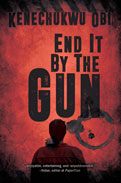
 |
Writing about writing is fraught with peril. Often the writer has two strikes against him before he even begins. Strike one—the reader is seldom as interested in the subject as the writer. Strike two—if rejection is a major component of the story, the reader can almost never reach a level of empathy that equals the writer’s personal and likely visceral experience with the raw emotion of continually being turned down. This is not to say that waxing profound on the suffering of writers is doomed to failure. Certainly, Philip Roth, Michael Chabon, John Irving, and others have found ways to achieve success at this arduous task. However, it is not a challenge to be taken lightly, but it is one author Obi takes a roundhouse swing at in this fevered tome.
Beck, a would-be writer from the plains of Nebraska, is a scribe who keeps getting told that his stories are not good enough to interest the Hollywood moguls he continually tries to impress. His wife, Julie, has grown tired of being the only breadwinner in the family. An argument over the development of his eleventh such tale results not only in the opening of old wounds, raised voices, and recriminations but also Julie’s abandonment of Beck and the family dog.
Beck, however, is a cellmate of discouragement. The two have lived together for so long that the writer simply cannot countenance giving up on his writing. He forges ahead, and, lo and behold, he catches the attention of filmdom’s movers and shakers—or at least he thinks he does. Somehow, he winds up with a strikingly beautiful agent and an expensive pad in Los Angeles. That’s when things really start to go way off the rails. Kidnapping, uninvited sexual coupling, and more begin to overwhelm the young man from the plains who is now knee-deep in La La Land’s hidden agendas and subterfuge. When estranged wife Julie seeks not only a rapprochement but also a keen desire to have Beck’s child, the complications multiply exponentially. Then, before you know it, you’re actually catapulted into that infamous eleventh story.
Obi narrates his chronicle moving back and forth between first-person stream of consciousness and third-person omnipotence. We seem to get the writer’s take on everything that’s going on around him in one instance, then suddenly we’re observers of other characters involved in other situations. Chapters help in some degree to delineate the writer’s story from his fictional one, but transitions are often murky, leaving one to question exactly which literary universe one is inhabiting. Pacing, though, is in the author’s favor. He seldom slows down to over-explain that which he’s already covered. Plus, he provides enough backstory to make supporting players’ attitudes and behaviors relatively credible. Obi also injects references to various current events and geopolitical conundrums into his tale that occasionally give it a contemporary, almost ripped-from-the-headlines feel. Of course, some are real, and some very much imagined.
As mentioned earlier, taking on the challenge of filling blank pages with a story about filling blank pages requires either immense courage or a large dollop of impetuousness. Readers can decide for themselves which of those fuels seems to most power Mr. Obi’s opus. Either way, the author shows that stories about writers coping with the professional and personal demands of their craft still have a place in modern literature.